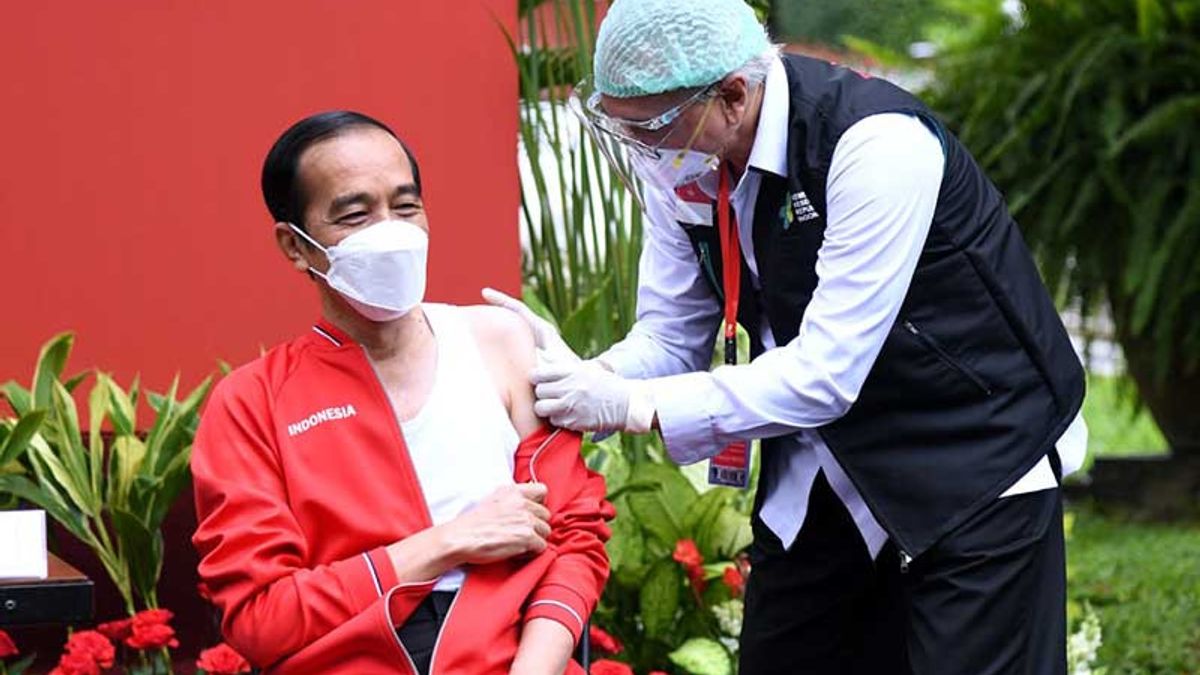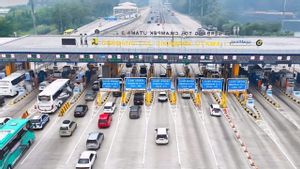JAKARTA - The government continues to pursue the COVID-19 vaccination target of at least 70 percent of the population by June 2022, but will be constrained by delays in the second dose.
In the Circular Letter of the Director General of Disease Prevention and Control number SR.02.06/II/921/2022 concerning the Provision of COVID-19 Vaccination for targets who drop out, it is written that the maximum interval between doses is six months. If it is missed, it must be repeated with a different type of vaccine from the previous one.
Data from the Ministry of Health (Kemenkes) as of February 23, 2022, the number of people who have received the full dose of the vaccine has reached 142.27 million or 68 percent of the total population. Whereas the minimum standard for a community to form group immunity is 70 percent.
Prioritizing vulnerable groups is the main task to complete vaccination. From the target of 21.55 million elderly citizens, the coverage of the first dose has only reached 74.69 percent.

Apart from being relatively slow, of the approximately 16.09 million people who received the first dose, there must be someone who needs to repeat it because it has been more than 6 months. Another challenge is the slow rate of national vaccination on a daily basis, where the daily increase is less than 1 percent, namely 0.43 percent or 578,805 people per day.
Data from the COVID-19 Handling Task Force stated that in detail, the recipients of the first dose of vaccine reached 190,228,123, while the recipients of the second dose were only 142,270,154. From the number of recipients of the first dose, it means that there are 25.21 percent of the population who need to immediately receive the full dose of vaccine.
A number of provinces in Indonesia need to accelerate the vaccine process to the public because the difference between the recipients of the first and second doses is very large. The five provinces with the largest difference are Aceh (48.28 percent), North Maluku (46.03 percent), Maluku (43.24 percent), Central Sulawesi (42.42 percent), and South Kalimantan (41.40 percent).
Factors delaying complete vaccination from six months include individual internal factors, such as physical body condition, risk of Post Immunization Adverse Events (AEFI) to awareness to receive the second dose of vaccine.
Interregional GapFrom the daily vaccination data released by the Ministry of Health, it shows the gap between regions. Some of the factors that cause the gap in the number of vaccine recipients include policy because the government has determined vaccination priority areas, then distribution issues.
During the 8 months of vaccination, there were several areas that had a shortage of vaccine stocks, such as West Sumatra, Lampung, and West Nusa Tenggara. As a result, the rate of vaccination is hampered.

Of the 34 provinces in Indonesia, there are only three provinces that have achieved complete-dose vaccination of more than 30 percent of the total population. The three provinces are DKI Jakarta (71.3 percent), Bali (56.6 percent), and the Riau Islands (35.9 percent).
Only 11 provinces have successfully vaccinated more than 50 percent of the population. Meanwhile, 10 provinces have even less than 40 percent, including Papua, which has the lowest vaccination rate at 13.62 percent.
Complete Vaccines Build ImmunityThe Global Alliance for Vaccines and Immunization (GAVI) institute reminded the importance of full-dose vaccination for the entire world community. For example, Pfizer and BioNTech vaccine types have immunity rates of up to 91.3 percent after two doses, even lasting up to six months after vaccination.
Likewise, Moderna with an efficacy level of 94 percent. Vaccination has been shown to reduce the potential for infection, severe symptoms, intensive care in the hospital, and the death of the patient. However, the immunity formed from vaccination will decrease drastically after a period of 3-6 months after vaccination.
Research from the Ministry of Health on 71,455 health workers in DKI during the January-June 2021 period showed that only 5.03 percent were infected with COVID-19 after receiving a complete vaccine and 0.17 percent requiring hospital treatment. Giving homologous vaccines (the first to third vaccine types are the same) of the Sinovac type can increase antibodies up to 7.8 times.
Complete VaccinationCurrently, the handling of the pandemic towards endemic continues to race against time amid the increasing number of COVID-19 cases. The government needs to ensure that all people get the vaccine on time or not more than six months after vaccination per dose.
Because its main purpose is to make the body immune to the corona virus if it is infected. Currently, almost all countries in the world have received booster vaccination or the third dose.
DKI Jakarta has succeeded in vaccinating more than 70 percent of its population, acceleration of vaccination needs to be focused on other areas outside Java-Bali to achieve the target of 70 percent of the population.

A press release from the National Institute of Health Research and Development of the Ministry of Health stated that the target of 70 percent of the population who received complete vaccinations could be achieved within 2-3 months with a vaccination rate of around 578 thousand people every day.
However, this condition still faces a number of inhibiting factors that may arise, such as community acceptance, access to areas, and individual comorbidities that can hinder the achievement of vaccination targets.
Seeing the enormous benefits of vaccination, especially full-dose and booster vaccinations, the COVID-19 vaccination program must receive the attention of all parties.
The English, Chinese, Japanese, Arabic, and French versions are automatically generated by the AI. So there may still be inaccuracies in translating, please always see Indonesian as our main language. (system supported by DigitalSiber.id)













